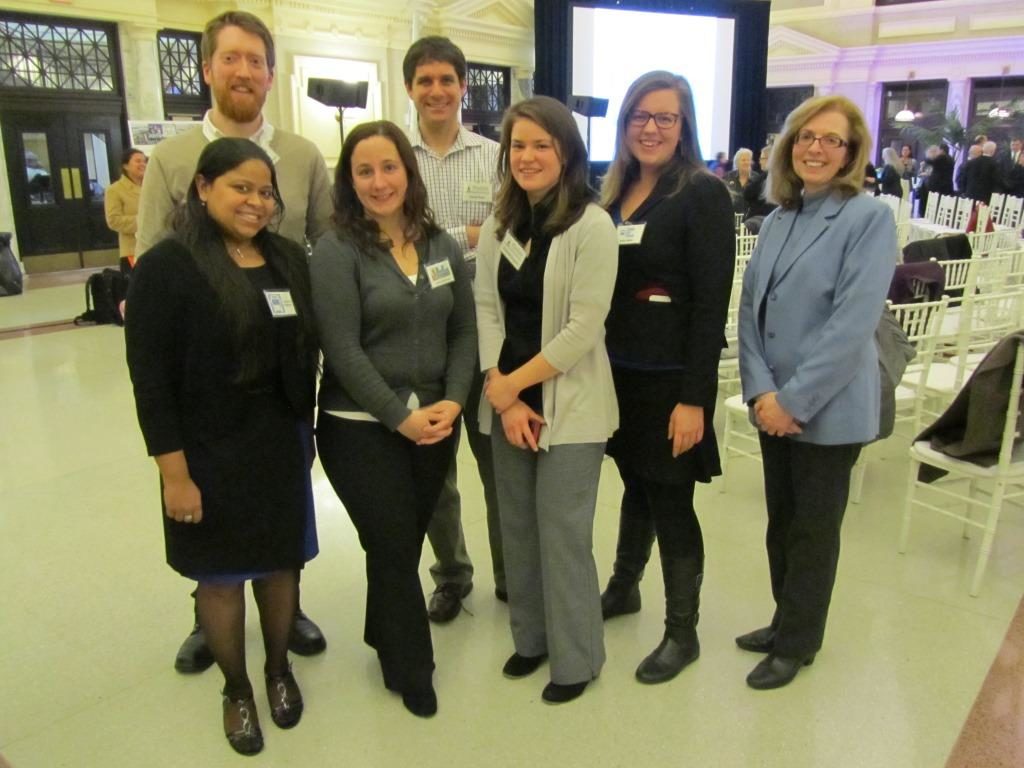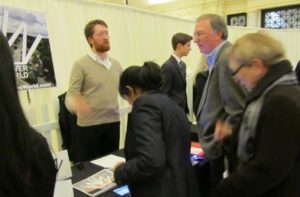
Several Clark University graduate students took part in a special Worcester Incubator for Innovation Launch event on Jan. 22, at Union Station in Worcester. As Fellows in the Art of Science Learning program, the presenting teams offered novel solutions for some of Worcester’s transportation challenges.
 Two years ago, Worcester, Chicago and San Diego were selected by Art of Science Learning to host Incubators for Innovation as part an initiative funded by a $2.6-million National Science Foundation grant. The purpose of the grant was to explore innovation at the intersection of art, science and learning.
Two years ago, Worcester, Chicago and San Diego were selected by Art of Science Learning to host Incubators for Innovation as part an initiative funded by a $2.6-million National Science Foundation grant. The purpose of the grant was to explore innovation at the intersection of art, science and learning.
The Worcester Incubator, hosted by EcoTarium and Clark University, has focused on developing innovative solutions to the area’s urban transportation challenges.
According to Joyce Kressler, director of the Worcester Incubator for Innovation, dozens of volunteers drawn from across sectors of education, sciences, business and the arts, have spent the past eleven months learning about innovation and working as innovators, using a cutting-edge new arts-based curriculum to spark innovation in STEM (science, technology, engineering, and mathematics) and STEM learning. Supported by national experts and local mentors, the Art of Science Learning Fellows have been developing transportation solutions to enhance Worcester’s economic activity, connect its communities, and improve the quality of life for its residents and visitors.
Nancy Budwig, associate provost and dean of research, served on the Art of Science Learning National Advisory Council. Jack Foley, vice president for government and community affairs and campus services, served on the Worcester Incubator Advisory Council, as did the late Ted Buswick, former executive-in-residence for leadership and the arts in Clark’s Graduate School of Management.
Following are brief descriptions of the innovations created by the seven Worcester teams, which were unveiled during the launch event, along with names of team participants from Clark:
PedSim route modeling is a new geospatial big-data tool that allows urban planners and private developers to model and quantify the potential impact of site selection and infrastructure improvements on pedestrians and cyclists.
Amanda Gregoire (BA ’10 Government/MPA ’11)
Daniel Rees (BA’09 geography/MA ’11 GISDE)
The PedSim group was approached by business owners and developers interested in the design, Rees said. “The incubator provided me with both the human capital (my teammates) and physical capital (money for the software to develop the model). It also provided a structured space for us to work and develop the idea and implementation of the model,” he added. “The work I did to build the model wouldn’t have been possible without the skills I learned at Clark. My courses in geography and computer programming as well as urban geography formed the backbone of the theory and skillset that I used to develop the model.”
Secret City Interactive is a new service that uses augmented reality and social media to create a visually engaging, interactive pedestrian experience designed to encourage neighborhood, historic, and cultural exploration, and the creation of user-user generated content to foster community learning and connections.
Lisa Drexhage (MBA ’11 social change)
The experience “pushed me out of my comfort zone on more than one occasion and reminded me that creativity is essential for any job or position,” Drexhage wrote. “I hope to take some of what I learned with me as I continue to work as a Project Manager for the Worcester Business Development Corporation (WBDC). I met some of the most creative and passionate people through this experience including some fellow Clarkies. I hope to continue to work with some of these individuals to promote the City of Worcester as a great place to live and work. Clark University pushes students to think critically and creatively. I used many concepts that I learned through the Graduate School of Management to help organize the team and push the project forward.”
Smart Transit for Healthcare is a new service that improves the ability of patients reliant on public transportation to access healthcare through a database/ application/web-based interface. The system allows service providers to optimize patient-transportation efficiency when scheduling appointments and provides patients with clear routing and timing information.
Moumita Dasgupta (MA ’12/Ph.D. ’15 physics)
“Art of Science Learning has been a very interesting and different learning experience for me,” Dasgupta said. “This experience gave me a creative freedom to come up with an innovative solution that addresses a real-life civic problem like transportation. This program has put me in front of unknown challenges, and I had to figure out ways to survive by working with a lot of uncertainties at times. Overall, it was a fulfilling experience for me as it gave me the opportunity to create this solution that would have a big impact in people’s everyday lives, especially the underserved communities, which is very important for me.”
Sprezza is a dynamically routed, multi-modal, demand-driven system that is built on a novel algorithm that integrates use patterns with real-time traffic and weather information to determine optimal bus and shuttle routes, hub locations and frequencies.
STEM Unplugged is a new middle-school science curriculum that uses the arts to teach transportation-related subject matter, as the focus of a series of lessons and classroom experiences that align with Next Generation Science Standards (NGSS). Tasks for Transit is a new process that increases the ability of low-income community residents to gain access to public transportation, while stimulating support for community-based social services. The process leverages the sharing economy by recording hours worked by non-profit volunteers into bus passes, which partnering non-profit organizations dispense to individual clients in need.
Robin Miller (MBA/M.S. Environmental Science and Policy ’16)
Miller, who has worked with Stand up for Kids, the South Worcester Neighborhood Center, and Sustainable Clark, expressed the gratification she felt after learning that a man using their bus pass to get to a job interview did get the job. Miller said she thought the incubator project was “a really interesting model for approaching innovation in the community … just a great way to learn, to meet a lot of people. I used a lot of the knowledge I’ve gained at Clark while doing something to benefit the community.”
Wires Over the World is a new project-based, NGSS-aligned, high-school science curriculum that consists of a MOOC (Massively Open On-Line Course) about urban-transportation alternatives coupled with an engineering and design competition focused on aerial-transportation technology and systems.

Christopher Markman (BA ’08 Screen Studies/MS ’16 M.S.I.T)
Markman worked on the project’s website design and had “even taken some aerial photos of Worcester with my drone camera to help show people what it would be like to see the city from that point of view.”
The incubator program could serve as national model, Art of Science Learning founder Harvey Seifter told the Boston Globe’s Beta Boston: “We’ve done the first broad-based experimental study of the impact of arts-based learning on creative thinking skills, collaborative behavior, and innovation outputs … The projects are just amazing, and in each community they’ve dug deeply into these deeply intractable problems.” There are plans to replicate/pilot a similar Art of Science Learning effort at Clark University in the future, Seifter added. Click here for more information about the Art of Science Learning program


